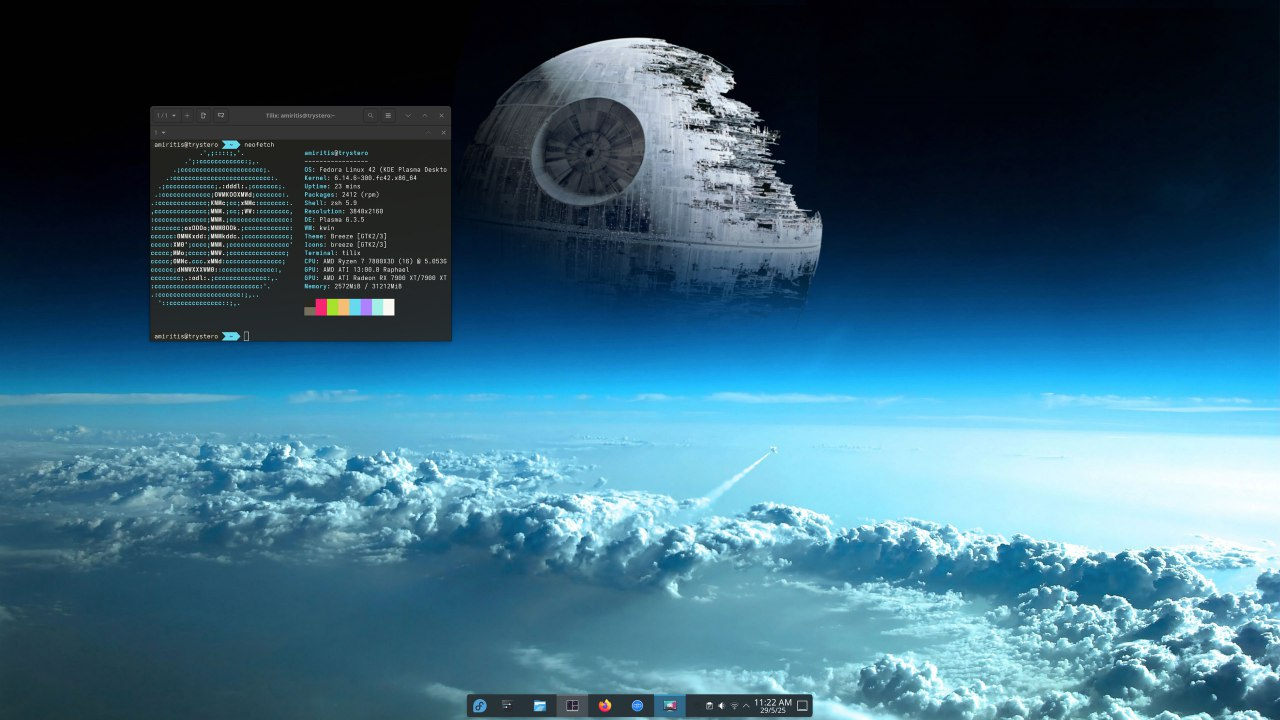Switching from Gnome to KDE on Fedora
Introduction
I’ve been contemplating moving from Gnome to KDE for a while now. I’ve been on Gnome for nearly 10 years. Most of my friends are on KDE, and I’ve been meaning to give it a try. I feel that Gnome has been lacking some features, and potentially support for a while now, and I haven’t been super happy with my setup. Every time I upgrade, I always find myself having to muck around with plugins again, and I feel that it would be a pain to recreate what I had, which is still relatively standard.
I didn’t want to do a clean install and manually swap to the KDE Spin. I also couldn’t find any complete instructions for doing exactly what I wanted, so I wrote these. I hope they help!
Instructions
🧰 Step 1: Install KDE
First, install the full KDE desktop environment group:
sudo dnf install @kde-desktop-environment
Then enable SDDM and set KDE as the default session:
sudo systemctl enable sddm --force
sudo systemctl set-default graphical.target
🔁 Step 2: Switch Fedora Identity to KDE
Fedora uses different identity packages depending on the desktop spin. I swapped mine from GNOME Workstation to KDE:
sudo dnf swap -y fedora-release-workstation fedora-release-kde
sudo dnf swap -y fedora-release-identity-workstation fedora-release-identity-kde
You’re also probably going to want to restart now, and boot into KDE.
🧼 Step 3: Remove GNOME Packages
Start by removing the GNOME desktop group:
sudo dnf remove @gnome-desktop
Then remove core GNOME packages:
sudo dnf remove \
gnome-shell gdm gnome-control-center gnome-terminal \
--setopt=protected_packages= --setopt=protect_running_kernel=false
Clean up:
sudo dnf autoremove
And list any remaining GNOME packages:
dnf list installed | grep gnome
🧹 Step 4: Remove Leftover GNOME Configs
Clear out user-specific GNOME settings and cached data:
rm -rf ~/.config/gnome*
rm -rf ~/.local/share/gnome*
rm -rf ~/.cache/gnome*
rm -rf ~/.config/dconf
rm -rf ~/.dbus
rm -rf ~/.themes ~/.icons ~/.fonts ~/.gtkrc*
⚙️ Step 5: Disable GDM and Final Cleanup
Disable GDM:
sudo systemctl disable gdm.service
sudo systemctl stop gdm.service
Set KDE as the default desktop in /etc/sysconfig/desktop:
sudo nano /etc/sysconfig/desktop
Contents:
DESKTOP=KDE
DISPLAYMANAGER=KDE
Remove GNOME session entries from login menu:
sudo rm /usr/share/xsessions/gnome.desktop
sudo rm /usr/share/wayland-sessions/gnome.desktop
🌐 Step 6: Remove GNOME Shell Integration Extension
If you used the GNOME Shell browser integration (Firefox/Chrome), remove it:
flatpak uninstall org.gnome.Extensions
Or remove the extension from your browser manually.
✅ All Done
After a reboot, I had a clean KDE environment: no GNOME apps, no GDM, no conflicts. I’m enjoying KDE a lot, the launcher is really nice, and the whole experience just feels that little bit better.
